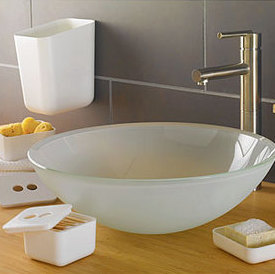
EcoGen is the product of a worldwide team of scientists, engineers and designers. First developed by British scientists in the late 1980s, recent patented improvements in fermentation technology by Dr. Xeujun Chen allow for the cost-effective production of PHBV.
The science is deceptively simple: To create EcoGen, they feed naturally occurring bacteria sugar that is obtained from corn starch. These “bugs” digest the sugar and store the resulting PHBV (poly-3-hydroxy butyrate-co-valerate) polymer much as the human body would store fat. Extracted from the “bug,” the stored “fat” becomes an injection moldable material. This material, Enmat®, is then blended with other biodegradable compounds to enhance its ability to process efficiently in standard injection molding machines. When exposed to microorganisms in compost or soil, EcoGen decomposes into carbon dioxide, water and biomass. Extensive scientific testing has established no harmful toxicity from the process or the end product.
The material’s natural decomposition requires exposure to bacteria commonly found in compost and many soils. So it will not deteriorate in the open air or with ordinary use. EcoGen can withstand temperatures of 110 degrees Centigrade / 230 degrees Fahrenheit and will last indefinitely under normal conditions.
To create practical household applications using this biodegradable material, Design Ideas enlisted the expertise of Professor Hans Maier-Aichen, an award winning plastics designer. Professor Maier-Aichen leads a team of engineers in Europe, China and America.

Comments by our Users
Be the first to write a comment for this item.